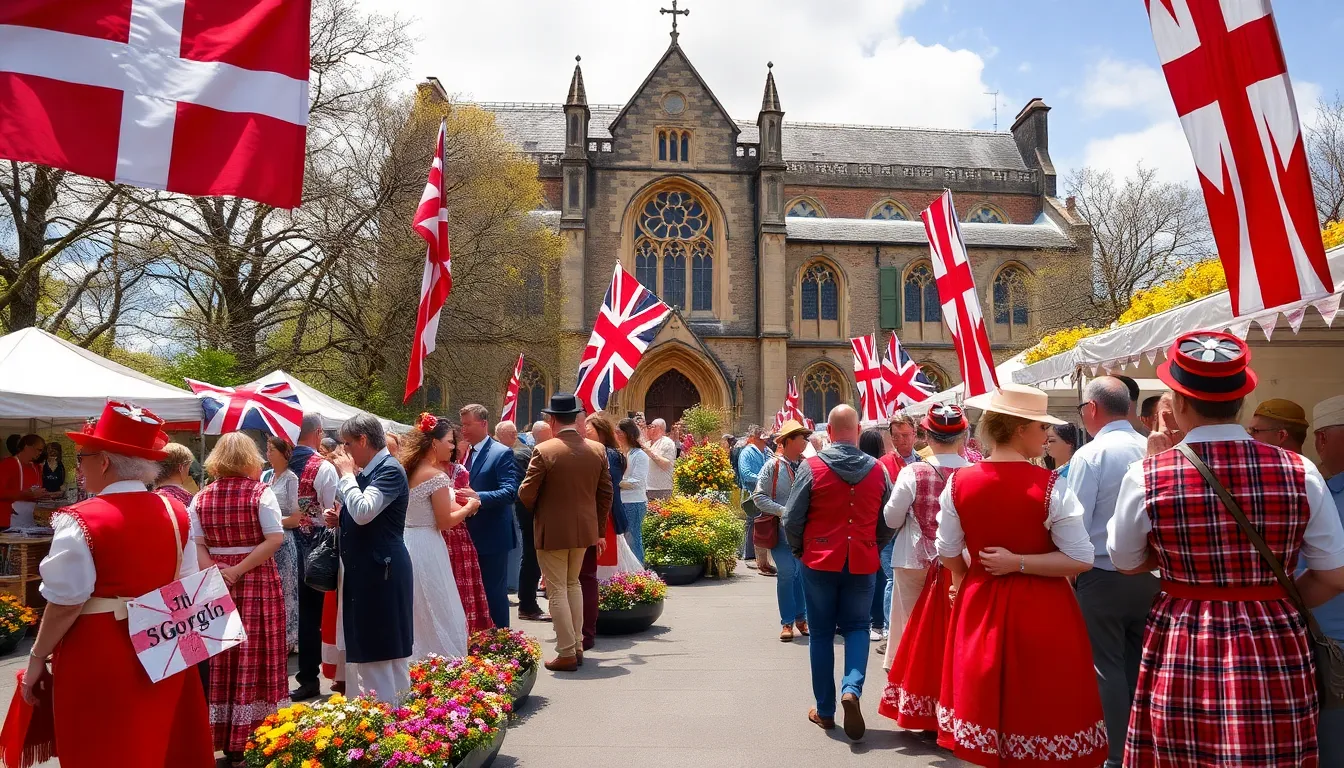Every April 23rd, England dons its red and white as folks celebrate St. George’s Day, the patron saint’s feast. But before you start planning your day off with dragon-slaying festivities, there’s a burning question: is it a bank holiday? Spoiler alert: it’s not.
Table of Contents
ToggleOverview of St. George’s Day
St. George’s Day is observed on April 23rd each year in England. This day celebrates St. George, the country’s patron saint, known for his bravery and chivalry. People often wear red and white, the colors associated with St. George’s cross. Parades and events occur across various towns and cities, reflecting cultural pride and heritage.
While St. George’s Day holds significance for many, it’s important to note that it is not a bank holiday. Workers typically go to their jobs as usual on this day. Activities such as local festivals and charity events can take place, enhancing community spirit. Schools and businesses may acknowledge the day through themed activities, but closures aren’t common.
St. George’s Day also faces a contrast with other national days like St. Andrew’s Day in Scotland or St. David’s Day in Wales, which enjoy official bank holiday status. This distinction highlights the varied recognition of cultural events within the UK. Despite the lack of an official bank holiday, conversations surrounding St. George’s Day remain lively, emphasizing its role in English identity.
In recent years, more organizations have promoted St. George’s Day, urging public recognition and celebration. Some people express a desire for changes in its status, advocating for better acknowledgment of England’s patron saint. Discussions about national pride often reflect broader conversations about cultural heritage and representation.
Historical Significance

St. George’s Day, observed on April 23rd, carries substantial historical importance. Its origins trace back to the early centuries of Christianity.
Origins of St. George’s Day
St. George, a Roman soldier and martyr from the 4th century, became the patron saint of England. Early narratives celebrated his bravery in the face of adversity, particularly the legend where he slays a dragon to save a princess. England embraced this story, associating St. George with valor and chivalry. By the 13th century, the Church recognized April 23rd as a feast day in his honor. It symbolized divine protection over the nation.
Evolution Over Time
Over the centuries, the observance of St. George’s Day transformed. Initially a religious feast, it evolved into a day celebrating English identity and cultural pride. The 18th century marked increased public celebration through parades and events. Local communities began to host festivities, promoting national sentiment. In the 20th century, English patriotism surged, leading to the incorporation of traditional symbols, such as the red cross on a white background. Despite the lack of official holiday status, grassroots efforts continue to advocate for recognition of this significant day.
Is St. George’s Day a Bank Holiday?
St. George’s Day, observed on April 23rd, lacks official bank holiday status in England. Many workers across the country continue their daily routines, attending jobs as usual on this day.
Current Status in the UK
Current guidance confirms that St. George’s Day is not a public holiday in the UK. Despite vibrant local celebrations, schools and businesses generally remain open. The absence of a bank holiday designation means that public events and festivities happen within the constraints of a workday, contributing to the mixed reception of the day. Advocacy for St. George’s Day recognition continues to grow, fueled by increasing discussions about heritage and national identity among communities.
Comparison with Other Holidays
When comparing St. George’s Day with other national holidays in the UK, clear differences emerge. St. Andrew’s Day in Scotland and St. David’s Day in Wales enjoy official bank holiday status, allowing for widespread celebration. Such holidays see school closures and business halts, providing an opportunity for reflection and festivity. In contrast, St. George’s Day does not come with similar recognition, despite its potential as a day to honor English culture. Grassroots movements are pushing for change, aiming for St. George’s Day to achieve similar status and prominence as those celebrated in neighboring regions.
Regional Celebrations
St. George’s Day sparks enthusiasm across England, with each region showcasing unique traditions and events.
How Different Regions Honor the Day
Regions embrace various customs to celebrate St. George’s Day. In London, colorful parades and street performances draw large crowds. Many places in Yorkshire hold fairs featuring local foods and crafts, emphasizing community spirit. In contrast, towns like Chester incorporate historical re-enactments, highlighting St. George’s legendary feats. Southern parts of England often organize family-friendly events, such as picnics and communal gatherings. Each celebration reflects regional pride while honoring England’s cultural heritage.
Local Events and Activities
Local events play a significant role in the St. George’s Day festivities. Many communities host themed festivals, offering activities for all ages. In some towns, schools participate in art projects and performances, engaging students in learning about their patron saint. Pubs and restaurants frequently serve traditional dishes, inviting patrons to experience local cuisine. Charity events also gain traction, where fundraising efforts support community causes. Engaging activities enhance the sense of belonging while spreading awareness of St. George’s significance.
St. George’s Day may not hold official bank holiday status but it remains a vibrant celebration of English culture and heritage. Communities across England embrace this day through parades festivals and local traditions that foster a sense of pride. The push for greater recognition reflects a desire to elevate St. George’s Day alongside other national celebrations. As discussions around national identity continue to evolve it’s clear that this day holds a special place in the hearts of many. Whether through community events or personal observances the spirit of St. George’s Day lives on, highlighting the rich tapestry of English history and culture.



